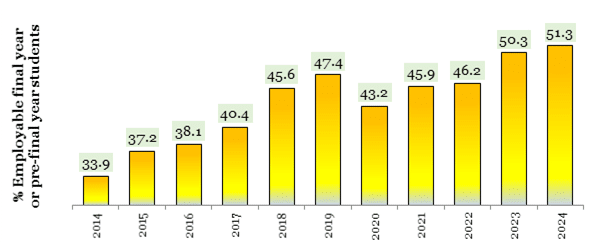Driving Workforce Growth in India

As India aims to solidify its position as a global economic leader, the need for a robust workforce has never been more critical. Talent and recruitment agencies are calling on the government to implement strategic measures in the upcoming budget. These measures are designed to enhance workforce growth, promote talent mobility, encourage diversity, and address skill gaps. The recommendations include tax incentives for job creation, adjustments to the Goods and Services Tax (GST) for staffing services, and a comprehensive policy framework for gig and contract workers.
Challenges in Leveraging AI
In the age of Artificial Intelligence (AI), employers face several challenges. Training staff, finding qualified talent, and providing flexible work arrangements are at the forefront. Many organizations struggle to fully harness the potential of AI due to these obstacles. An HR expert noted that rationalizing GST rates or allowing input tax credits on staffing services could significantly reduce compliance costs. This would make staffing services more affordable, ultimately encouraging job creation.
The integration of AI into the workforce requires a skilled labor pool. However, the current educational and training systems may not be adequately preparing individuals for these roles. Employers are increasingly looking for candidates who possess both technical skills and the ability to adapt to new technologies. Therefore, addressing these challenges is essential for companies to thrive in a competitive landscape.
Recommendations for Budget Measures
To foster a more dynamic labor market, industry leaders have proposed several key measures for the upcoming budget. These include introducing tax incentives for employment generation and rationalizing GST for staffing services. Currently, staffing services are subject to an 18% GST, which adds to the financial burden on companies. By reducing this tax, businesses could allocate more resources toward hiring and training.
Additionally, there is a call for enhanced reimbursement rates for stipends under the National Apprenticeship Promotion Scheme. This would encourage companies to onboard apprentices and transition them to permanent roles. Such initiatives would not only support long-term employment but also contribute to the development of a skilled workforce.
Industry veterans emphasize the need for a revamped curriculum in Industrial Training Institutes (ITIs) and vocational training programs. By aligning educational offerings with industry needs, the government can help bridge the skill gap and ensure that graduates are job-ready.
Promoting Diversity and Inclusion
Another critical area of focus is promoting diversity within the workforce. The industry has urged the government to introduce fiscal incentives for companies that prioritize diversity in hiring. This includes hiring women returnees, veterans, and individuals from economically weaker sections. By fostering an inclusive work environment, companies can benefit from a wider range of perspectives and ideas.
Addressing the gender gap in the workforce is particularly important. Women have historically faced barriers to entry and advancement in various industries. By implementing policies that support diversity, the government can help create a more equitable job market. This not only benefits individuals but also enhances overall economic growth.
Observer Voice is the one stop site for National, International news, Sports, Editor’s Choice, Art/culture contents, Quotes and much more. We also cover historical contents. Historical contents includes World History, Indian History, and what happened today. The website also covers Entertainment across the India and World.
Follow Us on Twitter, Instagram, Facebook, & LinkedIn

